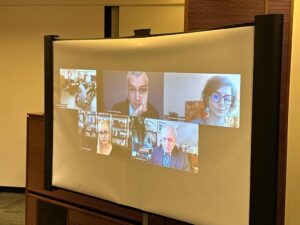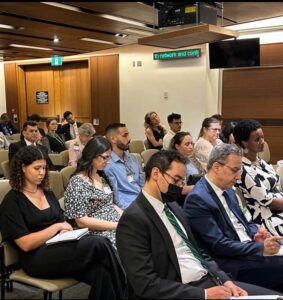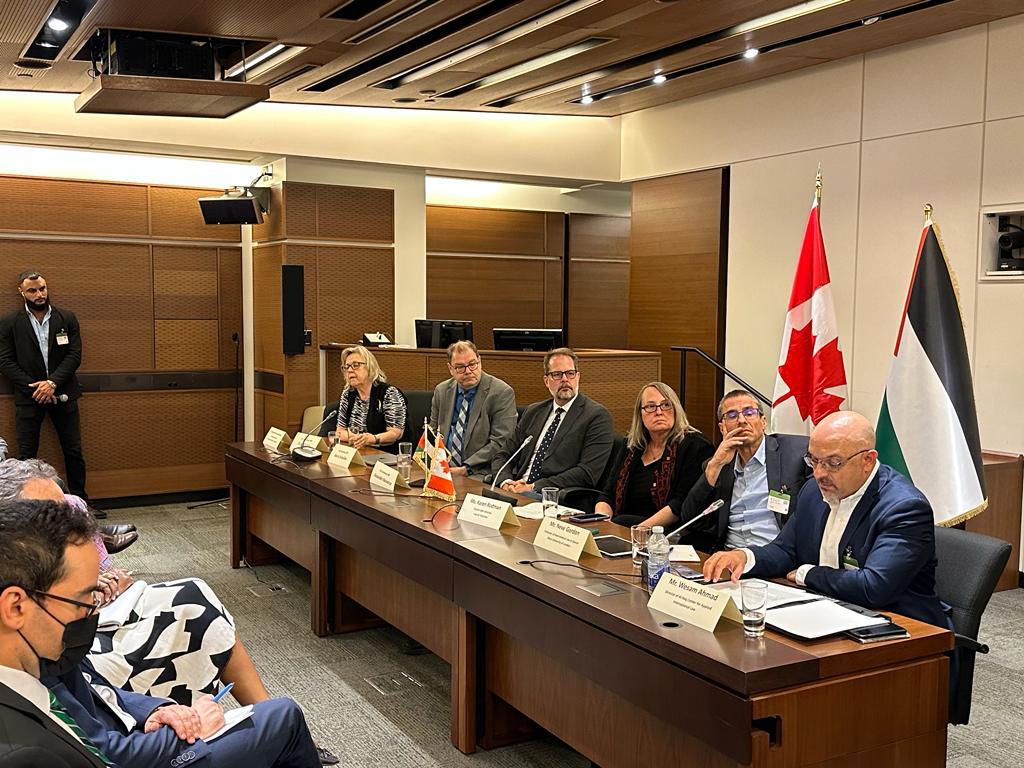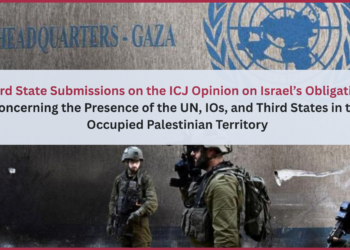Law for Palestine Co-Hosts Event Highlighting
Canada’s Responsibility Towards Palestine Under International Law
Law for Palestine, in collaboration with the Palestinian General Delegation to Canada and Canadian Members of Parliament, including Alexandre Boulerice MP (New Democratic Party Deputy Leader), Elizabeth May MP (Green Party of Canada Co-Leader), and Mario Beaulieu MP (Bloc Québécois Former Leader and President), organized a significant event titled “Embracing Responsibility: Canada’s obligation towards Palestine under international law” on May 31, 2023.
Bringing together notable speakers, the hybrid event gathered a diverse audience of over 150 officials, civil society activists, and researchers, who joined either in person or online. The event was held at the Parliament Hill in Ottawa and also made accessible through virtual platform (zoom), all with the aim of addressing the prolonged Israeli occupation of Palestinian Territory and Canada’s role in addressing this critical issue. Serving as the event’s moderator was Karen Rodman, a Human Rights Advocate affiliated with Law for Palestine.
During her opening speech, Mona Abuamara, the Chief Representative of the Palestinian General Delegation to Canada, emphasized the significance of Canada’s responsibility toward the Palestinian cause as a third country and a leading defender of human rights and the international rules-based system. She urged Canada to avoid treating Palestine as an exception while upholding the integrity of the international system and to cease treating Israel as exempt from its obligations.
The attending Members of Parliament called upon Canada to embrace its responsibility towards the Palestinian cause and actively work towards ending the occupation by compelling Israel to assume its responsibilities before the international community, thereby contributing to the achievement of justice and peace in the region.
Francesca Albanese, the UN Special Rapporteur on the situation of human rights in the Palestinian territories, opened the discussion by emphasizing how Israel’s military occupation has violated the Palestinian people’s right to self-determination for over half a century. She highlighted Israel’s colonization approach, including the use of illegal settlements to fragment the West Bank and the violation of Palestinian cultural identity and political expression. Albanese underscored that these actions constitute war crimes under international law.
“This engineered violation of the right of self-determination, accompanied by the logic of displacing the native population and replacing it with illegal settlers is the hall mark of settler colonialism”
Albanese also addressed Canada’s position as a global leader and its responsibility to champion a paradigm shift towards Israel and Palestine. She urged Canada to re-establish the supremacy and respect for international law without exceptions or double standards. Albanese made three recommendations: First, the realization of Palestinian self-determination should be a precondition to any negotiated solutions for the Israel-Palestine conflict. Second, third states must fulfill their obligations under international law, including implementing political and economic sanctions against Israel. Third, there must be accountability for war crimes and crimes against humanity through the pursuit of cases at the International Criminal Court (ICC) and International Court of Justice (ICJ), as well as through universal jurisdiction.
Michael Lynk, former UN Special Rapporteur on the situation of human rights in the Palestinian territories, criticized Canada’s approach towards the Israeli occupation. Lynk argued that Canada’s support for international law in principle has not been reflected in its actions. Despite formally acknowledging the application of international law to the Israeli occupation, Canada has failed to support pro-Palestinian resolutions at the UN and has remained silent in the face of Israeli annexation and colonization. Lynk emphasized that Canada’s position undermines its international reputation and its commitment to a rules-based system.
Lynk also explores the fundamental role that settlements have in Israeli occupation, in forcing occupation into becoming annexation. Lynk notes that more than 10 percent of Israel’s population now live in illegal settlements on occupied territory. Despite 7 UN security council resolutions and 164 UN general assembly resolutions on the settlements, Israel refuses to take action.
“The only credible explanation for Israel’s continuation of the occupation and the thickening of the settlement regime is to enshrine its sovereign claim over parts or all of the Palestinian territory.” Michael Lynk
Triestino Mariniello, from the legal team representing victims of Israel’s military offensives against Gaza before the International Criminal Court (ICC), discussed the progress of the ICC’s investigation into the Palestinian situation, which might be one of the most documented cases that may amount to war crimes and crimes against humanity, and Canada’s approach to it. Mariniello highlighted concerns about the lack of support for the ICC’s investigation, including the lowest budget allocation compared to other cases.
Mariniello pointed out that Canada has contested Palestine’s engagement with the ICC, showing a double standard when it comes to international justice. Mariniello stressed Canada’s obligations as a state party to the Rome Statute. He called on Canada to actively cooperate with the ICC and provide support in addressing Israeli war crimes.
Wesam Ahmad, Director of Al-Haq Center for Applied International Law, discussed Canada’s colonial past and its relationship with Palestine’s colonial present. He emphasized the need for Canada to address its own history and its contemporary support for Israel’s apartheid regime. Ahmad highlighted the role of Al-Haq in advocating for Palestinian rights under international law, including targeting key aspects that support the apartheid regime, such as the economic infrastructure that operates within illegal Israeli settlements and sustains the occupation. Ahmad went on to highlight the distinguishing feature of Israeli colonialism with Israel’s use of multinational corporations. Through the economic incentive, the wider international corporate and general community becomes complicit in Israel’s continued colonial enterprise at the expense of Palestinians.
Ahmad urged for the closure of loopholes enabling tax and charitable funds to support settlement enterprises. He emphasized the need to regulate Canadian companies operating in conflict and occupation zones and advocated for the ban of settlement products in Canada. Ahmad stated that failure to take these actions would contribute to the acceptance of illegal settlements, thereby undermining the international legal system.
Neve Gordon, Professor of International Law at Queen Mary University of London, addressed the use of the apartheid framework to describe Israel’s treatment of Palestinians. He highlighted how the term “apartheid” has been used by various UN special rapporteurs to describe Israel’s actions within the occupied territories. Gordon acknowledged the limitations of the framework but stressed its legal legitimacy in exposing Israel’s actions as criminal. He also discussed the pillars of Israeli apartheid, including the institutionalization of discrimination through Israeli laws and the role of some civil society actors that “enhance and facilitate” Israel’s crime of apartheid.
Gordon then addressed the implications of Canada supporting an apartheid regime abroad. He urged Canada to implement more impactful measures, including trade sanctions and divestment from pension funds, in order to address Israel’s violations of international law. Additionally, he called on Canadians to be vigilant regarding Israel’s exports, as they contribute to the legitimization of undemocratic practices in supposedly democratic states. “I am referring here to apartheid democracy. A type of democracy that provides all the basic human rights to one ethnic group that I belong to, while denying these very same rights to another ethnic group so as to enhance social domination.”
The event also shed light on the concerning impact of the IHRA definition of antisemitism. Lara Friedman, President of the Foundation for Middle East Peace, delved into the subject, emphasizing the problematic examples provided in the definition. These examples intentionally blur the line between legitimate criticism of Israel and antisemitism. Friedman underscored that the IHRA definition obstructs genuine efforts to combat antisemitism by unfairly targeting Palestinians and their advocates. She further highlighted that the staunch support for the IHRA definition comes from the Israeli government and pro-Israel groups seeking to shield Israel from accountability for its actions against the Palestinian people.
“This (the IHRA definition) is anti-Palestinian racism in one of its crudest forms and I think it needs to be recognized as such”. Lara Friedman
Moreover, Friedman pointed out that the IHRA definition has faced substantial academic debate, with alternative definitions proposed by the Jewish community. She strongly asserted, “This (the IHRA definition) is anti-Palestinian racism in one of its crudest forms and I think it needs to be recognized as such.” Friedman emphasized that any endorsement of the IHRA definition by Canada would only serve to legitimize a deeply problematic definition.
During the question and answers panel, the speakers addressed inquiries from attendees, further delving into the topics discussed during the presentations. The event provided a platform for critical discussions on Canada’s responsibility towards Palestine under international law and its implications.









